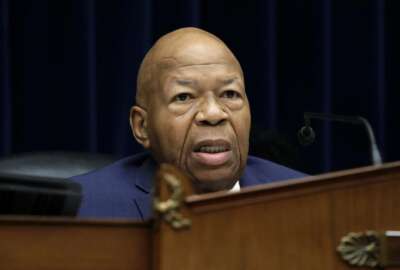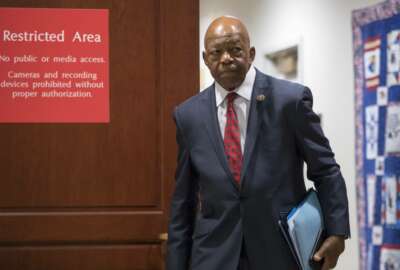
Cummings remembered as ‘true champion’ for federal workforce
Federal employees, members of Congress and good government governments remember the late House Oversight and Reform Committee Chairman, Elijah Cummings, as a ch...
Best listening experience is on Chrome, Firefox or Safari. Subscribe to Federal Drive’s daily audio interviews on Apple Podcasts or PodcastOne.
Federal employees are remembering Rep. Elijah Cummings (D-Md.) as a powerful speaker, a champion of government oversight and one of their biggest advocates.
Cummings died Thursday of complications from ongoing health issues. He was 68.
The Maryland Democrat had served for years as the ranking member and then chairman of the House Oversight and Reform Committee, where he led efforts on everything from postal reform to more flexible Thrift Savings Plan benefits.
His colleagues in Congress praised Cummings for his tenure as a vocal public servant and staunch civil rights advocate.
“As much of a critic he, of course, was of this administration, he ran the committee with such even-handedness that he was admired by both sides,” D.C. Del. Eleanor Holmes Norton said in an interview with Federal News Network’s sister station, WTOP. “I recall just this week a member of the committee said, ‘how is Elijah doing?’ with a kind of compassion that you expect someone on our side who had known Elijah for some time. That’s who Elijah was.”
Rep. Carolyn Maloney (D-N.Y.) will take over leadership of the Oversight and Reform Committee, the Associated Press reported.
While committee members from both parties often disagree on political issues, Mike Hettinger, a former Hill staff member, now managing principal of Hettinger Strategy Group, said Cummings provided the “voice of reason and respect” that led to bipartisan legislation.
“You can argue and then all of a sudden it’s fine, and you can move a bill through on a voice vote or unanimous support. So I think he kind of epitomized that, because he was strong when he needed to be, standing up for what he thought was right in the committee, but he’d also be the one who would mediate the dispute,” Hettinger said in an interview Thursday.
Cummings leaves behind a long legacy of standing up for the federal workforce and advocating for public service as a profession, or even a calling.
“Congressman Cummings fought to improve how federal agencies operate and ensure that workers have the support and the resources they need to serve the public,” J. David Cox, president of the American Federation of Government Employees, said in a statement. “He was a principled leader and man of high ethics and integrity who used his elected position to help beat back efforts to privatize government services, politicize the civil service and undermine our democratic principles.”
The National Treasury Employees Union said the federal workforce had “lost a true champion.”
NTEU was quick to recall a speech Cummings gave to union membership at its annual legislative conference back in 2015.
“I know that sometimes you get a little discouraged,” Cummings said during his speech. “I know sometimes when you watch C-SPAN and watch our hearings, you get a little discouraged. But I’ve come by here to let you know I’ve got your back.”
NTEU members still talk about that speech four years later, the union said.
“People do not seem to understand that so many people come to government knowing that they’re not going to make the kind of money that they would make in the private sector,” Cummings continued. “But they come to government to feed their souls, to lift them up [and] to make their lives better.”
The National Active and Retired Federal Employees (NARFE) Association recalled how Cummings’ leadership inspired their members.
“His compassion for society’s underserved, courage in the fight for civil rights and powerful presence in the halls of Congress will be greatly missed,” NARFE National President Ken Thomas said in a statement. “Our condolences are extended to his family, friends, staff, House and Senate colleagues and the entire federal community, particularly NARFE’s Maryland federation, whose experience and connection with him allowed its members to see firsthand how advocacy in the policymaking process benefits the public good.”
Here are six notable bills, hearings and priorities federal employees will remember from Cummings throughout his time in Congress.
Pay, retirement benefits
Year after year, Cummings often led members from Maryland, Virginia and the District of Columbia in demanding higher pay raises for federal employees — or in demanding a raise to begin with.
In a hearing last May, Cummings led a fierce exchange with Trump administration officials about its proposed pay freeze for federal employees.
Cummings spoke often of the sacrifices the federal workforce had made during government shutdowns and the 2013 furloughs.
He was also quick to denounce proposals to cut federal retirement benefits, which circulated for years during the Obama and Trump administrations. He was quick to criticize such proposals that attempted to balance the federal budget “on the backs of federal employees.”
TSP Modernization Act
Federal employees can also thank Cummings for a series of new options to the Thrift Savings Plan.
Cummings, along with Rep. Mark Meadows (R-N.C.), introduced the TSP Modernization Act in June 2017. The bill, which passed within just five months, gave TSP participants a series of new options to withdraw funds from their accounts.
The substance of the bill was based off feedback from TSP participants, who had long asked for additional withdrawal flexibilities.
The Federal Retirement Thrift Investment Board rolled out the new withdrawal options to participants in September. Participants were eager to begin using them; within the first 24 hours of their launch, some 9,300-to-9,400 people had initiated or finished a new withdrawal request.
Whistleblower protections
Good government and oversight groups praised Cummings’ work to preserve and strengthen whistleblower protections.
He was an original co-sponsor of the House version of the Whistleblower Protection Enhancement Act of 2012, which required agency communications, non-disclosure policies and forms to give employees notice of their whistleblower rights.
When some agencies began to exclude that language from documents and other notices given to employees, Cummings demanded answers.
In addition, Cummings was a co-chair of the House Whistleblower Protection Caucus. He submitted an amicus brief on behalf of Robert MacLean, a Transportation Security Administration whistleblower who revealed wrongdoing at the agency and eventually won his case in the Supreme Court.
In a statement, U.S. Special Counsel Henry Kerner described a speech Cummings gave to the Office of Special Counsel workforce at the agency’s all-hands conference.
“Chairman Cummings delivered a rousing speech dedicated to public service and always being true to oneself, earning a lengthy standing ovation from OSC employees for his passionate words,” said Kerner, who worked with Cummings closely as a staffer on the oversight committee.
“The whistleblower community has lost one of its great champions,” Kerner added.
Cummings also introduced the All Circuit Review Act, which passed with overwhelming bipartisan support back in July 2018.
It made permanent a pilot in the WPEA that allowed whistleblowers to appeal decisions on retaliation from the Merit Systems Protection Board to any U.S. Court of Appeals.
This bill is especially significant today, as the MSPB still lacks a quorum. Federal employees and whistleblowers alike can’t take an appeal of an MSPB decision to the board without a quorum.
Support for inspectors general
In addition to his support for whistleblowers, Cummings led the charge on legislation that gave inspectors general the authority to conduct independent oversight of their agencies.
Cummings in 2016 co-sponsored the Inspector General Empowerment Act, which reaffirmed agency watchdogs’ access to all agency records. At an April 2018 committee hearing last year, Cummings said IGs work side by side with Congress to ensure agency oversight.
“We on this committee believe and know that you all do great work, and we really appreciate it. And if there were a time that we need you, we need you now. But they cannot do this work in a vacuum. Congress must fulfill its constitutional duty to conduct oversight of the executive branch. The entire system of oversight must work in order for the federal government to operate effectively and efficiently,” Cummings said.
A spokesperson for the Council of the Inspectors General on Integrity and Efficiency (CIGIE) called Cummings “a champion and supporter” of issues important to the IG community.
“His work as a legislator was critical to our community’s efforts to conduct more effective and independent oversight. And his personal integrity and moral courage provide a lasting example to all of us that strive to make government work better for the American people,” the CIGIE spokesperson said. “The inspectors general will deeply miss Chairman Cummings as an advocate for our shared ideals, and we will continue to be inspired by his commitment to better, more effective, and accountable government.”
A leader on postal reform
Representing a district with a high number of federal employees, Cummings supported nearly all pay and benefits legislation supporting the federal workforce, but he also stood out as an advocate for postal employees.
“He always looked to take care of people, whether those people were contractors or federal employees,” Hettinger said. “We lost a person who really was a true public servant, cared about the people.”
Over the past few years, he signed onto several bills that aimed to put the Postal Service on sturdier financial footing. At a June 2018 committee hearing, Cummings spoke out strongly against a Trump administration proposal to privatize the Postal Service.
“Like so many other ideas that come out of this White House, President Trump’s proposal to privatize the Postal Service is disorganized, unilateral and frankly incompetent. I do not think this plan is a serious one,” Cummings said.
Shortly after that hearing, the administration walked back that plan and instead opted for rolling back the collective bargaining rights of unions to negotiate for compensation.
Judy Beard, the legislative and political director for the American Postal Workers Union, in a statement, said Cumming was “a strong advocate for a public Postal Service and the rights of postal workers and other federal employees.”
“His tireless advocacy for civil rights and worker rights has been instrumental and his legacy is a reminder to us to continue our fight for economic and social justice,” Beard said.
Fredric Rolando, president of the National Association of Letter Carriers, called Cummings an “unyielding supporter of government workers.”
“Because of his leadership role on the House Oversight and Government Reform Committee, we worked closely with him for many years on postal issues and admired his deep knowledge of, and commitment to, the U.S. Postal Service and its employees,” Rolando said.
Advocate for collective bargaining
Federal employee unions also remembered Cummings for his unwavering support of their collective bargaining rights.
Cummings was part of a bipartisan group of current and former House members who filed an amicus brief on behalf of the unions and their case against the president’s workforce executive orders.
Unions initially won their case in federal district court, but the injunction on those executive orders has since lifted after a July decision from a three-judge appeals panel.
Copyright © 2024 Federal News Network. All rights reserved. This website is not intended for users located within the European Economic Area.
Jory Heckman is a reporter at Federal News Network covering U.S. Postal Service, IRS, big data and technology issues.
Follow @jheckmanWFED
Nicole Ogrysko is a reporter for Federal News Network focusing on the federal workforce and federal pay and benefits.
Follow @nogryskoWFED
Related Stories






